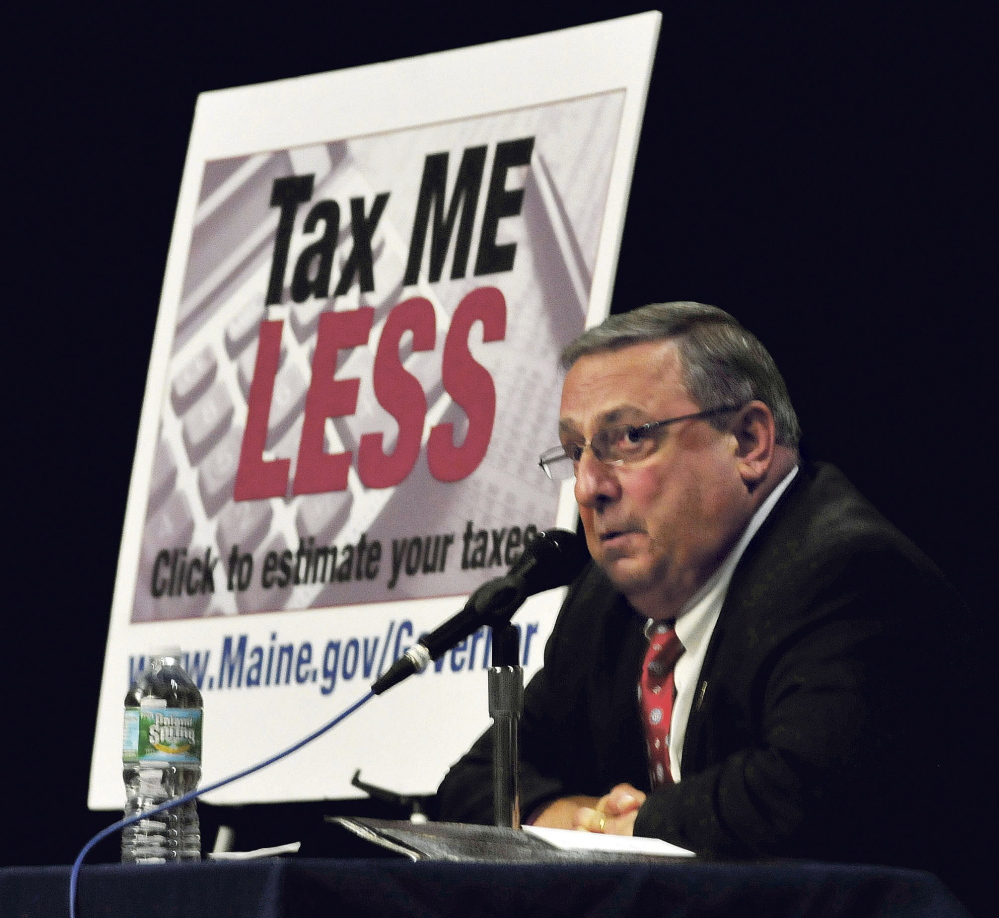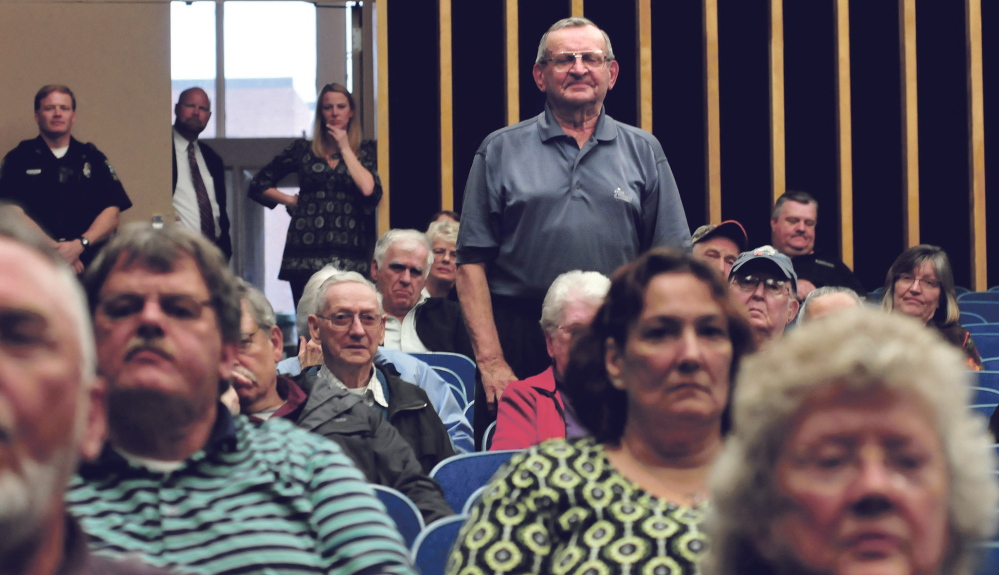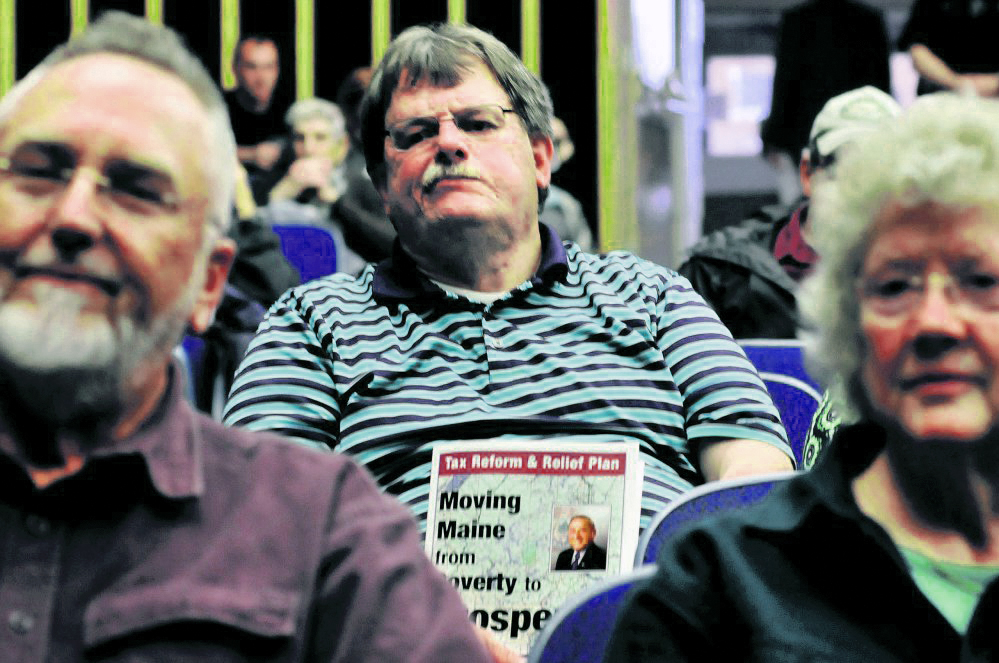SKOWHEGAN — About 40 people attended a town-meeting style gathering at Skowhegan Area High School Monday night, where they listened to Gov. Paul LePage pitch his $300 million tax relief plan and were given a chance to ask questions.
The meeting in Skowhegan was the ninth public meeting the governor has held as part of a tour around the state to pitch the plan, which is part of a proposed two-year $6.3 billion budget and emphasizes eliminating income tax and expanding sales tax.
“People who pay income tax have no say,” LePage said in his opening remarks at the forum. “You don’t even see it. It’s taken out of your pay check before you ever see it, and I think that is a little bit of a concern. I want to eliminate the income tax, and I want to go to a different format. I want to go to a consumption tax.”
LePage emphasized that eliminating income tax would help restore local control and encouraged residents at Monday’s meeting to support a statewide referendum on the income tax question.
The plan, known as the Tax Reform and Relief Plan, is set to unfold over two years and would reduce the income tax rate from 7.95 percent to 5.75 percent while simultaneously raising the sales tax from 5.75 percent to 6.5 percent.
The plan also includes an end to municipal revenue sharing and would allow cities and towns to tax nonprofit organizations with property worth more than $500,000.
Residents at Monday’s meeting were asked to submit their questions to the governor at the door, and then the questions were read by a moderator who posed them to the governor. The format drew criticism from some residents who said they felt like their questions were being screened.
“He didn’t answer my question directly,” said Derek Ellis, a Skowhegan resident who asked the governor about his proposal to eliminate the state’s current homestead exemption act for those under age 65. The act currently provides tax relief for some homeowners who have owned their residence for more than one year.
Ellis said he was concerned that eliminating the homestead exemption would mean an increase in local property taxes, something he said many residents in the Skowhegan area are already concerned about with the recent drop in valuation at Sappi Fine Paper.
“Who in their right mind doesn’t want more money in their pay check?” Ellis said. “But where is that money coming from and is it sustainable?”
Other residents at Monday’s meeting expressed support for the plan.
“I think it’s great,” said Anne Amadon, also a Skowhegan resident. “I do believe he’s made some big changes, and I think the majority of people would benefit more than they would be hurt by this.”
Lawmakers remain divided over the plan with many Republicans supporting the plan while Democrats are largely opposed to eliminating income tax.
“It was clear that people had real concerns over their property taxes,” said Rep. Jeff McCabe, D-Skowhegan, after the forum. He said Democrats are proposing a “Better Deal for Maine” plan that rivals LePage’s plan and would increase revenue sharing and funding to education. The LePage plan eliminates revenue sharing and would also result in a gap in the state budget that would likely result in cuts to education, he said.
McCabe was also critical of the governor’s proposal to tax non-profit organizations, saying it would hurt rural communities where revenue sharing is eliminated and there are no large non-profit groups that can be taxed to make up the lost revenue.
“It doesn’t really help rural Maine,” he said. “We don’t all have Colbys in our communities.”
Rep. Brad Farrin, R-Norridgewock, who was also at Monday’s forum, said he supports LePage’s plan because it would restore local control to municipalities. “If we can do away with income tax, yes, property taxes may rise, but we will have local control and can make more local decisions,” he said. “I think the governor’s plan returns local control to municipalities and gives people the chance to make choices.”
Rachel Ohm — 612-2368
Twitter: @rachel_ohm
Send questions/comments to the editors.






